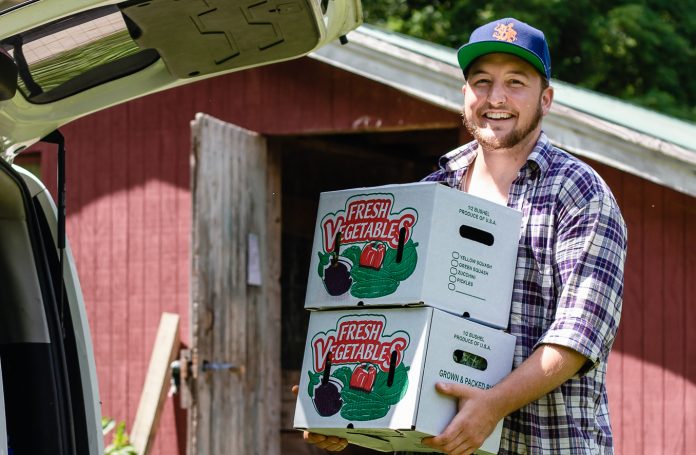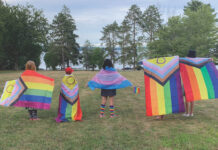[Editor’s Note: Despite challenging times, Bramblenook Farm, “a small veggie farm nestled in the woods between Providence and Boston,” plans to offer weekly doorstep deliveries of fresh produce to their supporters from late spring to early fall. Before COVID-19, we caught up with them for this story in our March/April 2020 issue:]
Sagan Gray runs a farm. They raise chickens. They harvest tomatoes, squashes and cucumbers. What they are most interested in growing, though, is a sense of community.
“In my life, there’s been a thread of wanting to create community space for marginalized voices and marginalized experiences,” says Gray. Bramblenook Farm, their 15-acre property in Berkley, Massachusetts, is a place to do just that. The farm is operated by a five-person, semi-cooperative household of queer friends who live on the property. They host community gatherings on a monthly basis, and welcome LGBTQ locals to attend potluck dinners, nature walks, skill shares and other events.
Besides producing delicious, pesticide-free food that reaches shareholders through a community-supported agriculture program—as well as diners at the Boston restaurant where Gray works as a bartender—Bramblenook is also a space where queer folks can connect with a rural experience that otherwise proves elusive.
After all, in order to find supportive social networks, appropriate health care and other important resources, many queer people must find refuge in urban environments. That they lack access to open, rural space is something that became quite apparent to Gray, who is nonbinary and transgender, about four years ago. At that time, Gray went on a journey of self-discovery, and spent a year bicycling the perimeter of the United States—living outside and camping on the yards and farms of friendly folks. Gray was awed by the sheer amount of rural space in America, but also by how rarely they encountered folks who shared their identity.
Occasionally, Gray would encounter “beautiful queer rural land projects” around the country. But even those experiences could be illuminating, in terms of the discomforts—and sometimes, dangers—that LGBTQ folks face in America’s farmlands. Gray recalls one incident, while celebrating with queer folks on a space in rural Tennessee, tucked discreetly a full mile off the main road, when a group of locals on motorcycles crashed the party to spin donuts in the parking lot, shout slurs—and, most frighteningly, make “very clear that they were armed,” says Gray.
Bramblenook Farm, which Gray started running a little over a year ago, is their way of planting some local seeds within the modern back-to-the-land movement that is increasingly appealing to many queer folks. (That movement is well captured in a recent full-length documentary film “Out Here,” produced by the Queer Farmer Film Project.) Besides creating necessary rural space for queer community, the farm’s thoughtful approach to responsible farming practices and economic justice—it offers sliding-scale pricing and donates surplus product—is an extension of Gray’s larger personal and political priorities.
After Gray started their coming-out process in their Virginia high school, which was located in an area with a large evangelical Christian community and military culture, they earned a degree in Peace and Justice Studies at Wellesley College. There, they had to navigate the complexities and challenges of attending an all-women’s school as a more masculine-presenting person. They understand deeply the importance of affirming, inclusive spaces.
On a more basic level, though, Bramblenook is still a farm that, like any other, is most concerned with growing the best possible product. When not working in the fields, you’ll find Gray mixing up cocktails at Bar Mezzana in Boston’s South End. That Italian restaurant’s chef uses Bramblenook produce there, as well as its nearby siblings—Black Lamb, an American brasserie, and Shore Leave, a trendy tiki bar. Gray also uses Bramblenook’s fresh herbs in drinks, such as the unique variety of mint that spruces up the Garden Party, a bright and flavorful spritz.
Going forward, Gray says they will continue to find ways to expand on Bramblenook’s mission.
“It’s really fun to be building community, getting to know people, strengthening ties and getting better quality of food into restaurants.”
For more on Bramblenook Farm and how you can support them, go to Bramblenook Farm’s Facebook page.
Not a subscriber? Sign up today for a free subscription to Boston Spirit magazine, New England’s premier LGBT magazine. We will send you a copy of Boston Spirit 6 times per year and we never sell/rent our subscriber information. Click HERE to sign up!









